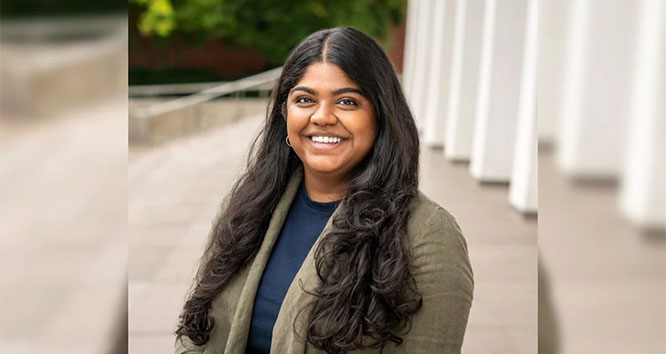An Indian-origin woman studying at the prestigious Princeton University in the US is among two students arrested over pro-Palestine protests on the campus, reports student and alumni newspapers.
Tamil Nadu-born Achinthya Sivalingan and Hassan Sayed were arrested after the protesters set up tents for an encampment in a university courtyard early Thursday morning, according to the Princeton Alumni Weekly (PAW).
The two graduate students were arrested on charge of trespassing and have been "immediately barred from the campus", said Jennifer Morrill, a university spokesperson, adding that setting up tents on the campus violated university policy.
However, they have not been evicted and will be allowed into their housing, another varsity spokesperson Michael Hotchkiss confirmed to the Daily Princetonian.
Ms Sivalingam is a student of Masters in Public Affairs in International Development at Princeton while Mr Sayed is a PhD candidate there.
In a statement, Morill said the students were given "repeated warnings from the Department of Public Safety to cease the activity and leave the area" and they now face disciplinary action. After their arrest, the other protesters "voluntarily" packed away their camping gear, she added.
Hotchkiss said the university did not evict anyone on Thursday and that the university allows students barred from campus to stay in their university-owned housing.
The undergraduate students were warned against occupation and encampment exercises in an email Wednesday, according to the Daily Princetonian.
Princeton students, faculty and community members, and even outsiders were part of the demonstration, the PAW cited organizers of the protest as saying. Large, white tents were set up nearby for upcoming reunions and other events.
A student who chose to be identified only as Urvi termed the arrests as "violent", which included the students being zip-tied around their wrists. The university, however, contested this and said the officers did not use any force and the arrests were made without any resistance.
Pro-Palestine protests have rocked the top US universities as thousands of students have hit their campuses to demonstrate against the Gaza deaths due to Israel’s inhuman military operation.
The protests, which began at Columbia University in New York, have to colleges across the country and saw hundreds of students confronting cops and raising pro-Palestine slogans. The protesters have been calling on their universities to divest from companies that profit from the Gaza war and advocate an immediate ceasefire.
Who is Achinthya Sivalingan?
1. Achinthya Sivalingan was born in Coimbatore, Tamil Nadu and was raised in Columbus, Ohio.
2. She is pursuing a Master of Public Affairs (MPA) degree in International Development at Princeton University. Before that, Ms Sivalingan studied world politics and economics at Ohio State University and was also an Intern at Harvard Law School.
3. Ms Sivalingan has significant experience in policy issues, having worked with civil society organisations, the legal system, politics, movement building, and private philanthropy. Her previous roles include supporting policy and advocacy work for climate adaptation, agricultural development, and nutrition portfolios at the Bill and Melinda Gates Foundation.
4. Ms Sivalingan has worked on a congressional campaign in Ohio's third district and also contributed to land rights and policy initiatives in India at the Centre for Policy Research.
5. She has been banned from Princeton over pro-Palestine protests and is now facing disciplinary action.








Comments
Add new comment